MY TIE-DYED DIATRIBE ON THE TRIBE
When a 1977 revival of the “American Tribal Love-Rock Musical” Hair opened on Broadway, it received more pans than Julia Childs’ kitchen. The original 1968 Hair had taken the theatre world by storm because it had given a palatable, exuberant and tuneful voice to the contentious counter-culture revolution. (It also helped that a beautiful, young cast bared more than their souls.) By 1977, the Zeitgeist of hippie activism had been exorcised: homosexuality had been removed from the American Psychiatric Association’s list of mental illnesses; sexual liberation was in full swing; the Vietnam war was over; and no youth were dying in the ideological Cold War. Even audiences inured to the ubiquitous yellow smiley face found Hair ponderously trite and moralizing. The message of sexual diversity and “turn-on, tune-in and drop-out” had faded; the theme was too dated to be relevant and too recent to be nostalgic, so it folded after 43 performances. Douglas Watt in the Daily News said, “It’s gone, kids, gone, lost in a marijuana cloud as we tiptoe uncertainly through the saintly ’˜70s.”
Now, the Public Theatre (original producers of the 1967 pre-Broadway Hair) brings a national tour of their 2008 Broadway revival to the Pantages Theatre. Most of what made Hair a phenomenon remains intact here, but the show is now a period piece, a fantasy about a commune-as-society, one which would discover that the idealistic flowers in its hair wilted and died because it could not take root in reality. Most audience members should have fun watching Hair (and run up on stage after the curtain call to celebrate with humpy hippies), even while they may have mixed feelings about celebrating a graveyard of ideals – the same idyllic vision that fizzled out by 1977. Lucky are those who can succumb to the drug-like haze of the proceedings without caring that they did not understand at least twenty-five percent of the lyrics, or noticing that there is no there there. For me, the show’s provocation came not from the hippie whose body lies dead on an American flag, victim of the Vietnam war, but the fact that we can clap along with the performers even as our ideals lie dead in the self-same flag.
Tony-winner Diane Paulus wisely directs her gorgeous and earnest cast to slather love on us thicker than would a religious tent-show revival, running up and down the aisles, baring belly-buttons while festooning us with flowers and “Be-In” pamphlets. (Even the cast bios forego their résumés for astrological signs and exclamations of joy and optimism.) Karole Armitage’s buoyant, bouncy choreography pops and slithers with the unbridled enthusiasm of a spontaneous Mazola Roll orgy. The infectious performances by a highly attractive cast are appealing and heart-warming. Galt MacDermot’s music, for the most part, remains infectious, robust and exceedingly harmonious, and the lyrics by James Rado and Gerome Ragni still manage to be pleasantly stimulating and often poetic (again, when they are intelligible).
But this is 2011 and we live in a politically bland and polarized era, dominated by compromises that please no one. Thanks to the media’s volcanic output, the issues of an unpopular war, sexual freedom, drug use, and nudity in the theatre are no longer (for most) shocking: You can buy a joint at the dispensary across the street; “Don’t Ask, Don’t Tell” was quietly and anticlimactically repealed; and miscegenation is far from scandalous, as evidenced by Corporate America’s usage of mixed-race couples in their ads. Instead of inspiring, the issues raised in Hair manage to come off as merely amusingly relevant – because although we are still hashing over the same topics (black president, gay marriage), we are largely doing so from the comfort of our own homes.
In the 1960s, the theatrical “happening” was still in its infancy, a “happening” being an artistically orchestrated performance (often a series of discontinuous events) involving audience participation. Paulus’s production perfectly mimics the happenings of the ’˜60s, but the conceit has faded from electricity to a warm, cozy glow – an experience which seems antithetical to the societal questions raised in Hair. The current version calls to mind a celebration more like Halloween on Santa Monica Boulevard. Can you imagine the shock wave that washed through 1968 audiences when a bosomy tourist named Margaret Mead sang her conviction that males should be free to adorn themselves, and then opened her dress to reveal that she was a he? As on the Boulevard, the audience for this revival cheered the transsexual reveal with approval, just like an Oprah crowd that roots for the underdog.
Unlike the 1977 audiences, Baby Boomers may encounter a warm wave of reminiscence watching this Hair (one critic was one big smile when he said to me, “It sure does take you back, doesn’t it?”) and younger audiences may relate to the angst that comes with inheriting a societal mess from know-it-all parents. Either way, the astoundingly winning ensemble needs to hype us into feeling as if we are part of the times in which the musical takes place: at one point, there is even a cheering competition between orchestra and mezzanine seats. (I detest being hyped; just show me the work and I’ll let you know if I am enthusiastic.) When the cast incites the audience to clap along, it is difficult to respect the lyrics we can’t hear. Perhaps I remain aloof in my response to a perfectly decent production because I am torn by the planned spontaneity of it all: I want to dance in the aisles and have a gathering, but my conscience reminds me that we live in a society that is more apt to protest an American Idol judgment than the Iraq War. That is why this Hair may be perfectly coiffed but it doesn’t resonate. One wonders if it is even possible to update the show for modern relevance.
The Pantages is one of the most beautiful theatres in America, but it’s a shame that national audiences are forced to see Broadway transplants in humongous houses; they erode our experiential connection to the show because the cavernous conditions force us to feel the love from far away. Although the sound design is much less strident than previous shows at the Pantages, auditory balance still proves a challenge. Would that large houses could implant speakers in the seats as Cirque du Soleil does in Las Vegas.
There are those who will find unadulterated jubilance watching Hair; those who will have fun but feel blasé; those who will be sad that the fire of ’60’s idealism is cold; and those who will feel more apt to party than protest. As for me, I’d like to protest the stagnant and disillusioned cultural dark ages we live in wherein the “Best” that Broadway has to offer on tour is a pleasant trip down memory lane, like looking at a faded photograph in a museum. When one theatergoer commented that Hair was “delightful,” I thought, “It’s gone, kids, gone.”
photos by Joan Marcus
Hair
national tour at Hollywood Pantages
ends on January 23, 2011
for tickets, visit Hollywood Pantages
tour continues through January 29, 2012
for more info, visit Hair The Musical
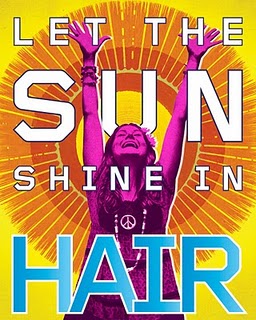
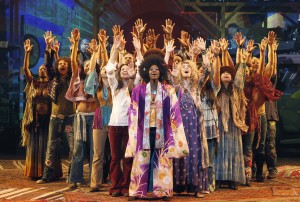
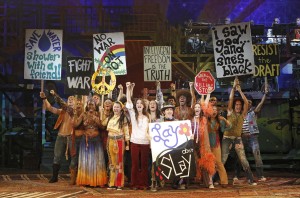
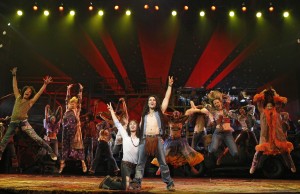
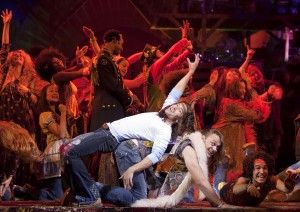
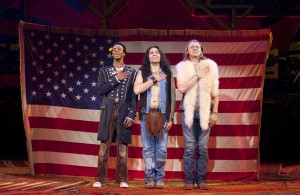
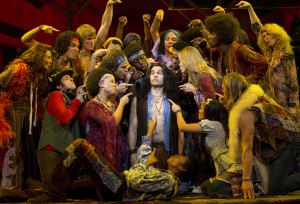

{ 1 comment… read it below or add one }
Love your reviews Mr. Frankel! Exceptionally written and done with true flair and humor. Hats off to you!